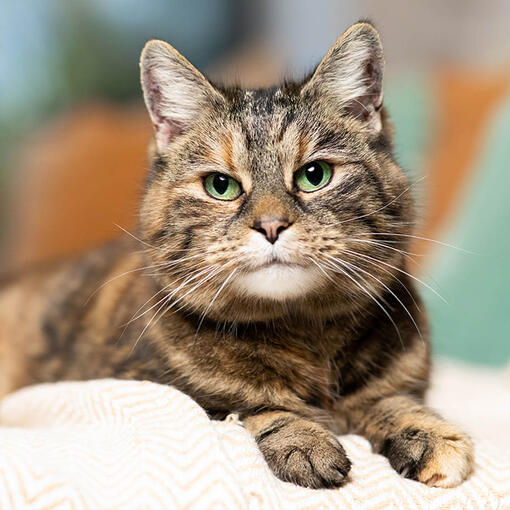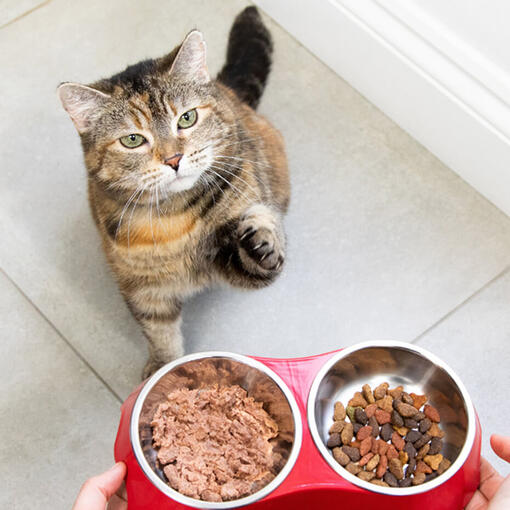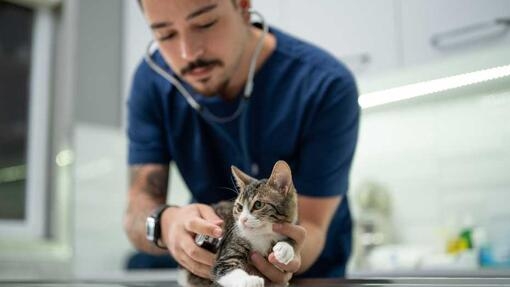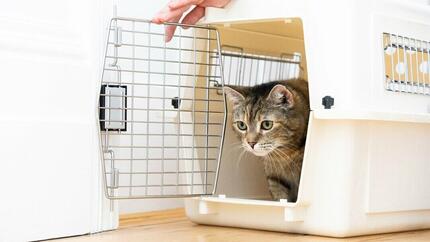Heart Murmur in Cats: What It Is, Symptoms & Treatment

Heart murmur in cats is a condition that has the potential to affect a cat’s life in many ways. As a pet owner, it can be worrying.
We’ve listed all you need to know about feline heart murmur, including the clinical signs (or symptoms) and treatment. Read on to find out more.
What is heart murmur in cats?
A heart murmur in cats is an abnormal blood flow within the heart that causes a whooshing sound. Your vet will be able to detect if your cat has a heart murmur by listening with a stethoscope. They may need to do some investigations, such as a heart scan, to determine the nature of the heart condition that is causing the murmur, and the impact that this may have on your cat’s life.
What are the grades of heart murmur in cats?
Feline heart murmurs range in severity. One system that vets use for describing heart murmurs, is to listen with a stethoscope and grade them from one (the quietest) to six (the loudest).
- Grade 1: soft and often difficult to hear.
- Grade 2: soft and may still be difficult to hear.
- Grade 3: this is easily heard when the stethoscope is first placed over the cat’s heart.
- Grade 4: a murmur that can be heard across the heart and both sides of the chest.
- Grade 5: a loud murmur that has a vibration across the chest wall, which can sometimes be felt when a hand is placed on the chest. It can be heard with a stethoscope but before it touches the chest wall.
- Grade 6: The loudest heart murmur that may even be heard without a stethoscope.
Is heart murmur in older cats common?
Heart murmurs are more common in middle-aged and senior felines, than in youngsters. If a heart murmur is found in a younger cat, it is often due to congenital heart disease, in other words a heart condition that has been present from birth.
If you suspect your cat of any age could have a heart murmur, make sure to contact your vet.
How long will a cat live with a feline heart murmur?
How long a cat will live with a heart murmur depends on the underlying heart condition that is causing it.
With the right treatment, cats can live for many years even with severe heart murmurs. It’s important to seek advice from your vet to discuss the best treatment options for your cat.
What causes heart murmur in cats?
There are many causes of heart murmurs in cats, from congenital heart disease, to diseases that affect the heart muscle such as hypertrophic cardiomyopathy, as well as age-related heart failure.
Heart murmurs may also be present in conditions that affect the circulation such as:
- Cat pregnancy
- Cat obesity
- Anaemia in cats
- Loss of weight in cat
What are the signs of heart murmur in cats?
For cats that have severe heart murmurs (grades 4-6), there are some signs that you can look out for:
- Poor appetite in cats
- Weight loss
- Lethargy
- Breathing issues
- Pale gums
If you notice any of these signs, contact your vet right away. It’s also important to understand your cat’s body language, so you can assess when something’s not right.
How is feline heart murmur diagnosed?
A vet will be able to tell if your cat has a heart murmur by listening to their chest with a stethoscope. This way, they can hear the whooshing sound that is synonymous with feline heart murmurs. The vet can also assess which grade of heart murmur it is.
What is the treatment for heart murmur in cats?
Not all feline heart murmurs require treatment, and careful monitoring may be all that is required. In other cases your vet may prescribe medication to support heart function and reduce fluid build-up. Whether treatment is needed or not, it is still important to attend regular veterinary check-ups.
We hope this article on heart murmurs in cats was helpful. Luckily many cats with feline heart murmurs can still live long and happy lives. But as always, contact your vet if you have any concerns about your cat’s health. Next, read our article on how to tell if your cat is overweight, a condition which can increase the risk of heart disease.









